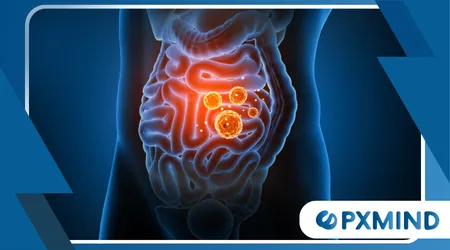Il legame tra salute intestinale e funzione cerebrale

Il profondo legame tra salute intestinale e funzione cerebrale non è più una teoria marginale.
Annunci
Per anni abbiamo considerato l'intestino come un semplice apparato digerente, separato dalle complessità del cervello.
Tuttavia, un crescente numero di prove sta rimodellando la nostra comprensione di questa complessa relazione.
A quanto pare, ciò che mangi e lo stato del tuo microbioma intestinale hanno un impatto significativo sul tuo umore, sulle tue capacità cognitive e persino sulla tua salute mentale.
Questa connessione è mediata da un sofisticato sistema di comunicazione bidirezionale.
Non si tratta più solo di una "sensazione istintiva". La scienza sta ora mappando i percorsi neurali, ormonali e immunologici che collegano questi due organi apparentemente distanti.
L'asse intestino-cervello, come è noto, è una superstrada di informazioni, in cui avviene uno scambio costante di segnali.
Immaginatela come una conversazione che avviene sotto la superficie, una conversazione che stiamo appena iniziando a comprendere veramente.
L'asse intestino-cervello: una strada a doppio senso
Al centro di questa connessione c'è il nervo vago. Questo nervo importante funge da canale di comunicazione primario, inviando segnali dall'intestino al cervello e viceversa.
È un incredibile canale biologico che trasmette informazioni sullo stato del tuo apparato digerente direttamente al tronco encefalico.
Ma la conversazione non si limita a un singolo nervo. Anche ormoni e neurotrasmettitori, come la serotonina, svolgono un ruolo cruciale.
Infatti, ben il 95% della serotonina presente nel corpo viene prodotto nell'intestino.
Si tratta di una sostanza chimica potente, ampiamente associata a sensazioni di felicità e benessere. Un intestino felice si traduce spesso in una mente più felice.
Il microbioma intestinale: il partner invisibile del cervello
L'intestino ospita migliaia di miliardi di microrganismi, collettivamente noti come microbioma. Questo vasto ecosistema di batteri, virus e funghi è molto più di un semplice insieme di microbi.
È un fattore chiave nella regolazione della salute, influenzando tutto, dall'assorbimento dei nutrienti alla funzione immunitaria.
Un microbioma sano e diversificato è fondamentale per la produzione di una varietà di composti benefici.
Tra questi rientrano gli acidi grassi a catena corta (SCFA), come il butirrato, che costituisce una fonte primaria di carburante per le cellule che rivestono il colon.
Il butirrato ha anche proprietà antinfiammatorie e può attraversare la barriera emato-encefalica, influenzando direttamente la funzione cerebrale.
Al contrario, uno squilibrio del microbioma, noto come disbiosi, può avere conseguenze negative.
Per saperne di più: Come il multitasking influisce sulle prestazioni del cervello
Un intestino malato può causare permeabilità intestinale, consentendo alle tossine di entrare nel flusso sanguigno.
Ciò può innescare un'infiammazione sistemica, sempre più spesso associata a condizioni neurologiche come ansia e depressione. Un ambiente intestinale caotico crea uno stato interno caotico.

La scienza dietro la connessione: uno sguardo più approfondito
La ricerca rivoluzionaria dell'ultimo decennio ha consolidato l' legame tra salute intestinale e funzione cerebrale.
Ad esempio, uno studio del 2021 pubblicato sulla rivista Neuroscienze della natura hanno dimostrato una chiara relazione causale nei modelli animali.
Guarda quanto è interessante: La psicologia del sorriso: più di un semplice toccasana per l'umore
Lo studio ha scoperto che il trapianto di batteri intestinali da topi ansiosi a topi privi di germi ha portato i topi riceventi a manifestare comportamenti più ansiosi.
Questo è un esempio lampante di come il microbioma possa influenzare direttamente il comportamento e gli stati emotivi.
L'influenza dell'intestino sul cervello è un'interazione complessa. Non si tratta di un singolo microbo magico, ma piuttosto dell'azione collettiva dell'intera comunità.
Un microbioma diversificato ed equilibrato fornisce una protezione contro lo stress e l'infiammazione, mentre uno meno diversificato può rendere il cervello più vulnerabile.
La relazione è simbiotica, in cui ciascun organo influenza l'altro in una delicata danza di segnali e sostanze chimiche.
Esempi concreti e una visione analogica
Considerate questo: chi soffre di stress cronico spesso soffre di problemi digestivi come la sindrome dell'intestino irritabile (IBS).
La segnalazione costante dal cervello all'intestino, attraverso il nervo vago, può alterare il naturale equilibrio della flora intestinale.
Ciò, a sua volta, può esacerbare la risposta allo stress, creando un circolo vizioso di disagio e ansia.
È come un circolo vizioso di sofferenza, in cui l'intestino e il cervello aggravano costantemente il problema.
Al contrario, pensate a una persona che inizia a seguire una dieta ricca di alimenti fermentati, come yogurt e kimchi.
Leggi qui: Rimborsa i debiti, metti al sicuro il tuo futuro e adotta uno stile di vita senza preoccupazioni.
Col tempo, potrebbero non solo sentirsi meglio fisicamente, ma anche notare un miglioramento del loro umore.
Questa non è una coincidenza; è il lato positivo legame tra salute intestinale e funzione cerebrale in azione.
I batteri benefici presenti in questi alimenti contribuiscono a creare un ambiente intestinale più sano, che a sua volta invia segnali positivi al cervello.
Questa relazione è come un giardino. Se pianti una varietà di semi sani (dieta varia), otterrai un giardino bello e resistente (un microbioma sano).
Se pianti solo erbacce e trascuri il terreno (una dieta povera), il tuo giardino diventerà invaso e malsano, proprio come il tuo sistema interno diventerà vulnerabile allo stress e alle malattie.
Lo stato del giardino riflette direttamente la cura che gli dedichi.
L'impatto sulla salute mentale
Questa correlazione è particolarmente rilevante per la salute mentale. Le statistiche mostrano che le persone con disturbi gastrointestinali hanno maggiori probabilità di soffrire di depressione e ansia.
Ad esempio, si stima che circa il 50-90% degli individui affetti da sindrome dell'intestino irritabile soffra anche di un disturbo di salute mentale, evidenziando la significativa sovrapposizione tra queste condizioni.
IL legame tra salute intestinale e funzione cerebrale è più che una teoria: è una realtà vissuta da milioni di persone.
Questo non vuol dire che la salute dell'intestino sia la cosa più importante. soltanto causa di problemi di salute mentale, ma è un pezzo fondamentale del puzzle.
Un intestino malsano può essere un fattore determinante e intervenire può rivelarsi un potente strumento per migliorare il benessere generale.
Ciò solleva una domanda interessante: cosa succederebbe se un intestino più sano potesse portare a una mente più sana per così tante persone?

Andare avanti: passi pratici per coltivare l'asse intestino-cervello
Riconoscendo il legame tra salute intestinale e funzione cerebrale è il primo passo. Nutrire il tuo microbioma significa molto più di una soluzione rapida.
Richiede l'impegno a seguire una dieta equilibrata ricca di fibre, probiotici e prebiotici.
Consumare una varietà di frutta, verdura e cereali integrali nutre i batteri benefici dell'intestino. Anche l'integrazione di alimenti fermentati può essere d'aiuto.
Anche gestire lo stress attraverso la consapevolezza e l'esercizio fisico è fondamentale. Questo aiuta a calmare il nervo vago e a ridurre i segnali infiammatori.
Adottando un approccio olistico, puoi creare un ambiente in cui sia l'intestino sia il cervello possano prosperare.
IL legame tra salute intestinale e funzione cerebrale è una potente testimonianza dell'interconnessione del corpo e un promemoria che il vero benessere inizia dall'interno.
Domande frequenti sul collegamento tra salute intestinale e funzione cerebrale
Cos'è l'asse intestino-cervello?
Asse intestino-cervello è il termine che indica la rete di comunicazione bidirezionale che collega il sistema nervoso centrale (cervello) e il sistema nervoso enterico (intestino).
Coinvolge percorsi neurali, ormonali e immunologici, consentendo all'intestino e al cervello di influenzarsi reciprocamente.
In che modo una dieta povera influisce sul mio cervello?
Una dieta ricca di cibi lavorati, zuccheri e grassi nocivi può portare a uno squilibrio del microbioma intestinale (disbiosi).
Ciò può causare infiammazione, che può avere un impatto negativo sulle funzioni cerebrali, contribuendo a problemi come sbalzi d'umore, annebbiamento cognitivo e aumento del rischio di disturbi come ansia e depressione.
Migliorare la salute intestinale può invertire i problemi di salute mentale?
Sebbene il miglioramento della salute intestinale possa rappresentare una parte importante di un piano di trattamento per i problemi di salute mentale, non è una cura a sé stante.
Può ridurre l'infiammazione, migliorare l'assorbimento dei nutrienti e influenzare positivamente la produzione di neurotrasmettitori, tutti fattori che possono favorire una migliore salute mentale.
Tuttavia, è opportuno utilizzarlo in concomitanza con un consulto e un trattamento medico professionale.
++ La connessione intestino-cervello
++ La connessione intestino-cervello: come funziona e il ruolo dell'alimentazione
